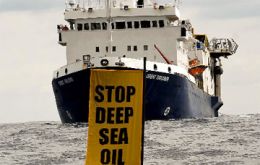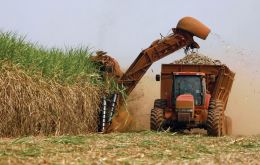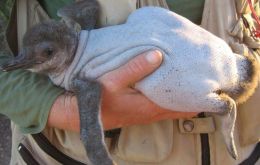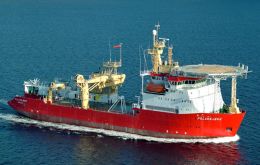MercoPress. South Atlantic News Agency
Environment
-
Tuesday, April 12th 2011 - 21:04 UTC
Majority of EU citizens want their fish from sustainable sources

An overwhelming majority of EU citizens want the fish they buy to come from sources that are sustainable and not over-fished, according to an independent poll commissioned by World Wildlife Fund, WWF, and carried out in 14 EU countries.
-
Tuesday, April 12th 2011 - 20:48 UTC
EU makes effective tough new fisheries control system from “net to plate”

A new system of fishery control with continent-wide, common rules and penalties is now fully operational, the European Commission said on Tuesday.
-
Tuesday, April 12th 2011 - 20:20 UTC
Antarctica penguin species suffering from declining krill availability, says NOAA

A number of penguin species found in western Antarctica are declining as a result of a fall in the availability of krill, a study has suggested. Researchers, examining 30 years of data, said chinstrap and Adelie penguin numbers had been falling since 1986.
-
Tuesday, April 12th 2011 - 04:17 UTC
Uruguay expands alternative energy capacity with a 50 MW wind turbine farm

Uruguay continues to expand its alternative green energy capacity and the latest contract award will have 25 wind turbines which must be operational within a maximum period of three years. The wind power project of 50 MW will supply renewable energy to a population of 50,000 people.
-
Monday, April 11th 2011 - 05:24 UTC
Protestors force Petrobras to suspend off shore seismic surveying in New Zealand

Brazilian oil giant Petrobras suspended an offshore survey Sunday in New Zealand after several environmental activists jumped into the water to block the passage of the ship conducting the study, reports the NZ press.
-
Friday, April 8th 2011 - 22:10 UTC
Shell moves heavily into bio-fuels from sugar cane bagasse in Brazil

Royal Dutch Shell Plc, the world’s biggest distributor of bio-fuels, is shifting research to waste from sugar-cane farming after ending an algae project in Hawaii. Shell, Iogen Corp. and Codexis have been researching enzymes to produce cellulose ethanol from wheat stalks and sugar-cane bagasse, a sugar industry waste product.
-
Friday, April 8th 2011 - 21:54 UTC
“Naked” penguin chicks in Argentina and South Africa puzzle scientists

Researchers from the Wildlife Conservation Society, the University of Washington, and other groups are grappling with a wildlife mystery: Why are some penguin chicks losing their feathers?
-
Thursday, April 7th 2011 - 21:49 UTC
Three year contract for the new Ice patrol HMS Protector to replace the Red Plum

The Royal Navy will have a new ‘Protector’ of British interests in Antarctica. HMS Protector, upholding the famous name of the 1950s and 60s Antarctic survey vessel, is being loaned on a three-year trial with the Fleet while the long-term future of the Antarctic Patrol vessel HMS Endurance is considered.
-
Thursday, April 7th 2011 - 21:16 UTC
Antarctica unveils new mineral ‘wassonite’, found by NASA and co-researchers

NASA and co-researchers from the United States, South Korea and Japan have found a new mineral named “Wassonite” in one of the most historically significant meteorites recovered in Antarctica in December 1969.
-
Thursday, April 7th 2011 - 09:43 UTC
Falklands’ skua population has declined by almost half in five years

The number of Falkland Islands skua has declined by almost half in just five years, a survey of the bird's largest breeding ground reveals. It is unclear why the population has crashed on New Island, on the west of the Falkland Islands.
Something appears to be limiting the birds' ability to reproduce, say scientists.
